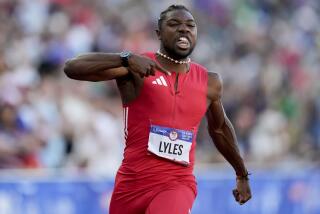Bruce Jenner Track Meet : Some World-Class Athletes but Still No Soviets
- Share via
SAN JOSE — As the international track and field season officially opens today with Bruce Jenner’s Bud Light meet at San Jose City College, there is less talk about the athletes who are here than those who are not.
That is a familiar theme at meets in the United States because of the difficulty in attracting name athletes from abroad this early in the season, but the disappointment is even more pronounced here because of what had been anticipated.
Seven of the Soviet Union’s best track and field athletes, including two world record-holders, withdrew earlier this week, creating confusion and controversy, another familiar theme in U.S.-Soviet relations.
Because this is the first of 16 IAAF Mobil Grand Prix meets, the only one in the United States, the Jenner event has attracted athletes from 12 countries, many of them world-class.
Of particular interest should be the 100-meter confrontation between the Santa Monica Track Club’s Carl Lewis and Canada’s Ben Johnson, who were ranked Nos. 1 and 2, respectively, in the world last year. Lewis has also entered the 200 meters.
Another race matching athletes ranked 1-2 in 1985 is the 400-meter intermediate hurdles, in which No. 1 Andre Phillips of the World Class Track Club will meet No. 2 Danny Harris of Iowa State.
Watching from the broadcast booth will be the world record-holder in the event, Edwin Moses, who missed last season with a knee injury and has not announced his 1986 schedule.
He is doing television commentary today for Ted Turner’s WTBS, whose officials were believed to be particularly disappointed by the Soviet withdrawal from the Jenner meet because they wanted to use this competition as a promotional vehicle for the Goodwill Games in Moscow this summer. WTBS, in conjunction with the Soviet Union, organized the Goodwill Games.
Not only are there no Soviet athletes here, there is not much good will because of the mysterious circumstances surrounding their absence.
While Soviet athletes competed in U.S. indoor meets in 1984 and this winter, this was the first time since 1978 the Soviet Union had agreed to send a team to the United States for an outdoor competition.
Among the Soviet athletes who were supposed to arrive here Wednesday was Tatiana Kazankina, the world record-holder in the 1,500, 2,000 and 3,000 meters, who was to make her comeback after being suspended for 18 months for refusing to take a drug test in September 1984.
Also among those expected to compete were Igor Paklin, world record-holder in the high jump, and Sergei Litvinov, former world record-holder in the hammer throw.
Without Litvinov, meet director Bert Bonanno canceled the hammer throw.
In an interview with the Associated Press, Vitaly Mayatsky, a Soviet Sports Committee official, said the athletes were unable to acquire their visas last Monday because the U.S. Embassy in Moscow was closed for Memorial Day and thus were unable to board their flight Tuesday.
The Soviet national coach, Igor Ter-Ovanesyan, told Sovietski Sport in Moscow that the athletes would not have been able to adjust to the time change in order to compete today if they had not left the Soviet Union until Wednesday.
Left unanswered was why they waited until Monday to try to pick up their visas. A U.S. State Dept. official in Washington told the Associated Press that the visas were available before then.
“These are the kinds of visas we would issue,” he said. “We regret the withdrawal of their applications.”
Speculation here is that Soviet officials decided their athletes were not ready for an international meet this early in the summer. The first significant competition for them is expected to come July 8-9 at the Goodwill Games, which is a Grand Prix meet.
This is the second year of the outdoor Grand Prix, which includes 16 meets in 14 countries, ending with the Sept. 10 finals in Rome. Athletes are awarded prize money based on points scored in meets.
Americans Mary Decker Slaney and Doug Padillia each won $35,000 last year, $10,000 for finishing with the most points in their respective events and $25,000 for winning the overall championships.
More to Read
Go beyond the scoreboard
Get the latest on L.A.'s teams in the daily Sports Report newsletter.
You may occasionally receive promotional content from the Los Angeles Times.






